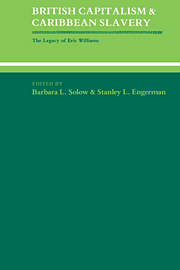Book contents
- Frontmatter
- Contents
- List of Contributors
- Preface
- British Capitalism and Caribbean Slavery: The Legacy of Eric Williams: An Introduction
- Part I Slavery as an Economic Phenomenon
- Part II Caribbean Slavery and the Industrial Revolution
- Part III The Decline of the British West Indies
- Part IV The Basis of Abolition and Emancipation
- Part V Capitalism and Slavery in Historical Perspective
- Capitalism and Slavery on the Islands: A Lesson from the Mainland
- “The Williams Effect”: Eric Williams's Capitalism and Slavery and the Growth of West Indian Political Economy
Capitalism and Slavery on the Islands: A Lesson from the Mainland
Published online by Cambridge University Press: 15 December 2009
- Frontmatter
- Contents
- List of Contributors
- Preface
- British Capitalism and Caribbean Slavery: The Legacy of Eric Williams: An Introduction
- Part I Slavery as an Economic Phenomenon
- Part II Caribbean Slavery and the Industrial Revolution
- Part III The Decline of the British West Indies
- Part IV The Basis of Abolition and Emancipation
- Part V Capitalism and Slavery in Historical Perspective
- Capitalism and Slavery on the Islands: A Lesson from the Mainland
- “The Williams Effect”: Eric Williams's Capitalism and Slavery and the Growth of West Indian Political Economy
Summary
In selecting a title for his now-classic book, Williams chose to relate one of the most palpable realities of Western economic history to one of the slipperiest abstractions of the Western intellectual heritage. With a rather different set of specific concerns, the same association has been at the heart of the debate over slavery in the United States, for the past two decades if not longer. Aroused primarily by the analysis set forth by Genovese in The Political Economy of Slavery and subsequent works, the mainland discussion has focused on the social identity and economic motivations of the slaveholding classes. Historians of British abolition have been more concerned with the motives and politics of the abolitionists in relationship to industrial capitalism. But there is a bedrock economic question common to both histories: was abolition facilitated by a decline of the slave economy? On close examination, there are many other thought-provoking parallels between the West Indian and North American cases. Yet, with a few significant exceptions, they have been treated separately. This essay takes an unorthodox historical approach. It first sketches a reasonably well-developed analysis of capitalism and slavery for the American South in the nineteenth century, and then carries the suggestions formulated by this exercise back to the eighteenth-century British West Indies to see what light they shed on the earlier experience.
This essay does not concern itself with confirming or refuting the “Williams thesis.”
- Type
- Chapter
- Information
- British Capitalism and Caribbean SlaveryThe Legacy of Eric Williams, pp. 283 - 302Publisher: Cambridge University PressPrint publication year: 1988

